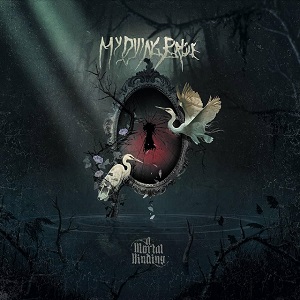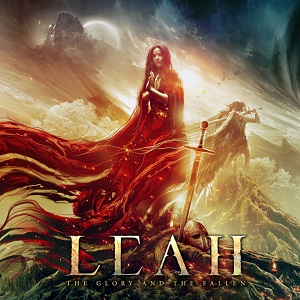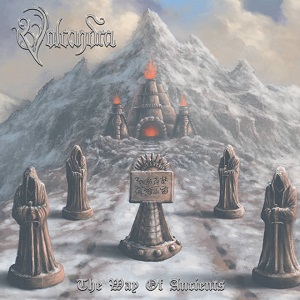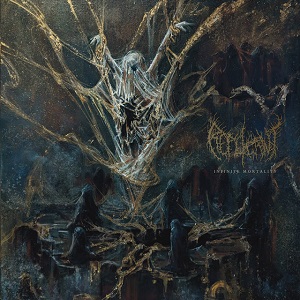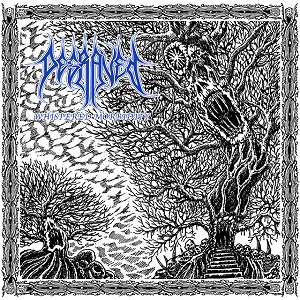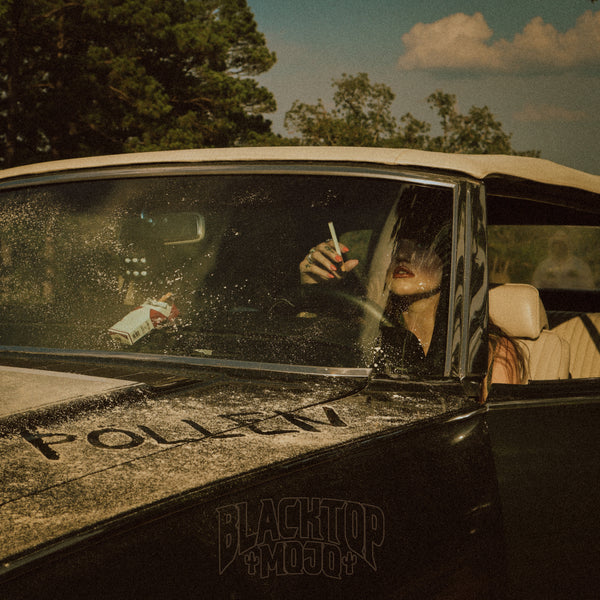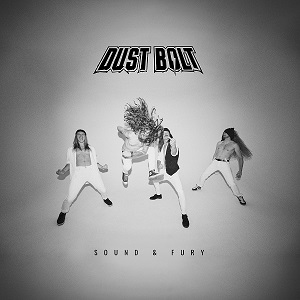JUDAS PRIEST Bassist Ian Hill On British Steel - "It Was The Definitive Heavy Metal Album"
April 9, 2010, 14 years ago
The 30 year anniversary of JUDAS PRIEST's British Steel is upon us, and Sony has reissued the album in expanded “legacy” form, adding a 30 minute making-of interview, two bonus tracks plus a massive live DVD from the last tour, which featured the album played in full, in sequence. Back in 1980, it was good to see Priest finally break big, and that record, not to mention the whole attendant NWOBHM, touched (or torched) off a golden ten years for metal.
“I guess up to that point, it was the definitive heavy metal album,” ventures bassist Ian Hill, a bold statement, but when you think about it, pretty defensible given the lyrics about metal and the solidifying of a whole metal package, including the leather of studs look and all told, an overt declaration of the love of metal. “It also crossed over into other areas. There was, as you know, a couple of very good radio-friendly tracks on there, in ‘Living After Midnight’ and ‘Breaking The Law’. So the radio stations started to pick up on those songs, and it started to gain us fans from areas we wouldn’t necessarily pick them up from. Maybe people who’d never go see us live, or bothered to be into the things we were into at the time (laughs). So it probably started heavy metal on its way to its popularity, if you know what I mean.”As alluded to, it was obvious to all the punters that the band had simplified things, something widely attributed, although in part, to the bringing on of Tom Allom as producer.
“He was suggested to us by the record company at the time,” says Ian. “When we first met him, we thought there’s no way this bloke could be a heavy rock producer. He was very public schoolboy. He came from a well-to-do family, and like I say, spoke very Queens English, sort of thing. We thought, this isn’t going to work. But he mixed the live album, Unleashed In The East, and he did a tremendous job on it, he really did, a great job on that, and we used him then, so he was with us for over ten years there, right up until... well, from ‘80 to ‘88, was the last one we did, which was Ram It Down, and he was with us all that time. Colonel Tom Allom (laughs). I think he was from a military family anyway. I think his first job was producing the marching band in the regiment, something like that anyway.”
And for such a landmark album, material was in short supply. In fact, the record times out at a scant 36 minutes. “Well, we wrote some of the songs, actually, in the studio. ‘The Rage’, I think was written, and oh, it was ‘Living After Midnight’ that was actually written in the studio. We came up short with material. We had just come off the end of a very long tour, a two-year cycle, and Ken and Glenn and Rob hadn’t got the time to write a complete album, so those two… it was a very hectic schedule, if you think about it. It was write, record, tour, write, record, tour, maybe with a couple of months off in-between. That’s all. For us to write a song and then not use it was almost like sacrilege.”
But with respect to the record’s brevity… “I think we were comfortable with it. I can’t remember at the time, but maybe we were a little bit concerned. Generally, albums in those days were 40 minutes. Any longer than that, I mean, you’re talking about the days of vinyl records here. The more stuff you put on, the more grooves there are on the record, the shallower the groove, and the shallower the groove, the less quality to it. The deeper the groove, obviously the stylus was sitting lower in the groove and it could pick up more information there. So 40, or 45 at a real push, and you’re starting to lose quality.”
Up to a previously proffered point, much of British Steel’s signpost status has to do with the entire metal package around it, with metal gods finally deciding on the proper way for metal gods to attire themselves.
“Just fell into it, really, “laughs Ian. “We were wearing all kinds of things, velvet, satin, denims, a whole eclectic look at one point. I think one day Rob walked in wearing a leather coat, a biker jacket, and we thought, gee, that looks pretty good, and we all got one. I think it was as simple as that. I think we just fell into it. It fitted perfectly with the music we were playing.”But no boardroom meetings around the idea?
“Not really; we all had our input. The closest I think we ever came to that was Turbo. And that was Ray Brown. Ray had been doing our clothes anyway for some time, and he said, ‘I know exactly what you need,’ and we let him to it, and he came up with a thing for each of us. And it worked for Turbo. Turbo was a very different album really. It was a very experimental album, and we went with that, and it didn’t take us long to fall back into individually-inspired, shall we say, stage clothes.”
How much of the look came from what you might have been seeing in the New Wave Of British Heavy Metal or the punk world?
“I don’t think so, no. The punk thing was just starting off at the time. Well, it’d be going for about five years or so, but we were never here to see it, per se (laughs). We were always out on the road or in the studio. The thought of us going out and catching a show in those days was alien to us. Obviously, it was in the music papers at the time, New Music Express and Sounds and Melody Maker, and things that that.”And then there was the lyrical direction of the record, more overt lyrics about the brotherhood of metal, which had crept in with Hell Bent For Leather, and very much with SAXON and other just-generating bands of the fabled NWOBHM…
“I think so, yes. The direction the music was going sort of attracted a certain audience anyway,” muses Hill. “We didn’t attract girls for instance (laughs). We used to at one time, but with the leather and the studs and the actual power, the raw aggression of the music, it was not something that was that attractive to the female audience. So most of our audience were boys, really. Teenage boys. Which we all were ourselves the time. We were sort of in our mid-20s at the time, maybe 30, but yeah, that was when the typical heavy metal fan, if there was such a thing, started to evolve.”Ian downplays the sense that there was any pressure from CBS for the band to break, but we are talking two records before the CBS deal and then fully four for that label. Surely…?
“I don’t think so, no. In those days, it was very, very different to the way it is now. The record company would actually look at an act and say, ‘This will earn us money over a period of time. It’s not going to earn us anything overnight. We have to wait for this. We have to nurture the popularity of the band.’ In fact, heavy metal in general, and heavy rock, fell into that category. There were very few… ZEPPELIN, that was basically blues rock, and SABBATH, they were at the top of their song then, I suppose, they were making it big, but very, very few others. We were all long-term projects. But there was never any real pressure. I mean, even WE thought it might be a good idea to have something a radio station might be able to play (laughs). So make something short and snappy, something under five minutes long, so it might get picked up. But other than that, there was no pressure. CBS, as it was then, have always been very, very good in that respect. They still are.”I told Ian about talking to KK when the band came through Toronto and played the album live, and KK’s interesting comment was that with British Steel, the band reminded themselves that rock ‘n’ roll was supposed to be fun.
“Yeah, I suppose he’s got a point,” agrees Hill. “Especially in ‘Breaking The Law’ and ‘Living After Midnight’. ‘Living After Midnight’ is the rock ‘n roll lifestyle, you know (laughs). ‘Breaking The Law’, I don’t know if you’ve ever seen the video for that, but that was a lot of fun. It might be a bit cringe-worthy these days, but at the time, we had a blast doing that. It was a little tongue-in-cheek. It wasn’t taken as deathly seriously at it had been before, maybe. Maybe we were getting a bit of a lighter side, and like I say, it could be a little bit tongue-in-cheek from time to time. It was evolving. We were getting across to the people who we wanted to get across to, which is basically people like ourselves. That’s who we were playing to, and as long as we had an audience and we were keeping them happy, that was the most important thing to us. And as I say, it was just the two radio tracks, or three maybe, that set this album aside, broke us into another audience, another area.”“There’s generally passages that are too long,” says Hill in closing, “things they can be cleaned up, shall we say. I don’t know, parts that are relevant to the song, clever parts, maybe, but it doesn’t just quite sit properly. There is always something you can cut out, but conversely, there’s always something you can throw back in (laughs). And as I say, the audience was maybe changing. The definitive heavy metal live audience, as you pointed out early on, was just coming into being then. You could go complicated, that was one route. You could go to a jazzier style, or you can carry on doing what we were doing. If we would’ve gone the more self-indulgent route, we would’ve ended up another Mahavishnu Orchestra (laughs).”
British Steel: Legacy Edition is due in stores on May 10th in the UK and May 11th in North America. For complete details visit this location.


